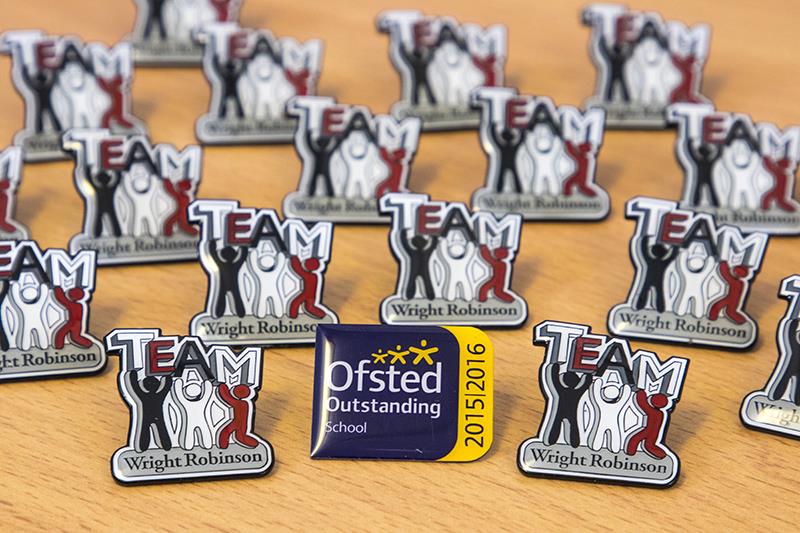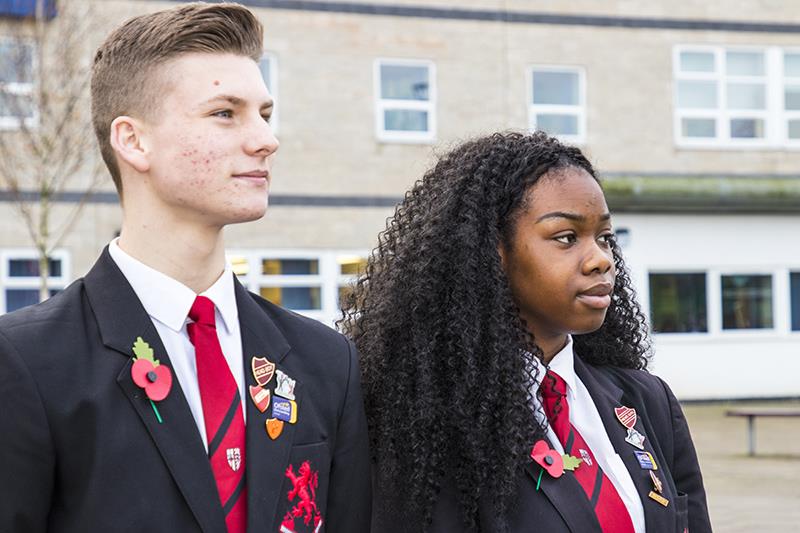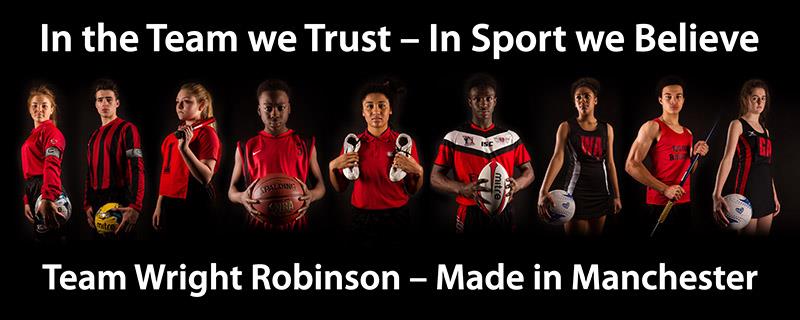Every pupil at Wright Robinson College wears a smart red, white and black badge with the words “Team Wright Robinson” emblazoned across it.
The three words embody the ethos of this high achieving school in Gorton, on the east side of Manchester. Teamwork is embedded through everything the school does, from the students’ behaviour to their attainment in the classroom and on the sports pitches.
Headteacher Neville Beischer introduced the Team Wright Robinson concept into the 1,800-pupil school in 2013. Inspired by Team GB’s success at the London 2012 Olympics, when sportsmen and women won a record 65 medals, the school’s senior leadership team hit on the idea of using teamwork to improve the college’s academic performance.
“The college has long understood the benefits that involvement in sport can bring to individuals, but more specifically the power and momentum that teamwork can bring to engage people and teams to improve their performance in sport,” explained Mr Beischer, who has been head of Wright Robinson College for 27 years.
“However, it was not until 2012 that the idea of teamwork being used to improve whole-college academic performance was floated.
“Everyone in Britain understood how the team culture, with its high aspirations generated by Team GB, helped them to achieve their magnificent medal haul. As a result of this, the idea of introducing teamwork into the Wright Robinson ethos and culture was explored and developed.”
The teamwork concept quickly took off. One of the school’s media technicians designed the eye-catching Team Wright Robinson badges, pictured below, which are presented to all year 7 pupils during assembly. The badges are worn on the left lapel of their blazers – “because it’s closest to their heart and Wright Robinson is in their blood”, said Mr Beischer.

Together: The TEAM badges handed out to all pupils and staff at Wright Robinson College
The teachers and support staff all wear the badges too and every classroom has a Team Wright Robinson placard on display.
Incorporating the teamwork ethos into all aspects of school life has resulted in rapid school improvement. In 2011 and 2014, Ofsted inspectors had told the school that it required improvement.
However, in 2016 Ofsted judged Wright Robinson, which is located in a diverse, inner-city area and where 60 per cent of students are eligible for Pupil Premium funding, to be outstanding in all areas.
“Pupils believe that the school is a safe haven in which to learn and flourish,” said the inspectors in their glowing report. “They wear their Team Wright Robinson badges with pride and are appreciative of the high-quality support and teaching they receive.”
Five years after Team Wright Robinson was launched, the school is one of the most popular in Manchester, with more than 900 applications for 360 places in 2018. Wright Robinson’s Progress 8 score in 2016 was 0.30 and 0.46 in 2017, putting it in the top 18 per cent of schools in the country. Student attendance is 96.2 per cent, above the national average of 94.6 per cent.
“The children come to school because they like the school, they enjoy it and because that’s what teams do,” said Mr Beischer. “They don’t let each other down.”
The pupils learn that with a combination of hard work and self belief they will achieve their potential. Not surprisingly, they are huge supporters of Team Wright Robinson.
“It has really helped me,” said head girl Esther Adetiloye, who is in year 11 and has ambitions to specialise in stem cell research when she is older.
“It has helped me understand that working together is so much better than working alone. Here we’ve got other people to support us, like the teaching staff and our friends, and it has helped to bring out my confidence and my leadership skills.”
Head boy and fellow year 11 student Corne Burger is equally enthusiastic. “Teamwork has been a really big part of my progress,” said Corne, who hopes to do an Apprenticeship in electrical engineering when he leaves Wright Robinson this summer. “Rather than arguing about each other’s differences we learn to accept them and see that everyone is good in their own way.”

Ambitious: Wright Robinson College's head boy and girl Corne and Esther
The teachers have embraced the concept of teamwork as readily as the pupils.
“There isn’t a ‘them and us’ here,” said deputy head of geography Charlotte Hudson. “We all work together. In class, when I say ‘work together, you need to get this done’, there’s no-one saying ‘I don’t want to do this’. They all say: ‘We’re a team. We’re going to get it done.’
“As the students get older you see that being such a tight-knit group has really helped to shape them as young adults. It helps them when they are applying for colleges too. The year 11s really show the skills of being able to work with others, listening to others and showing empathy. It means something to them.”
Nicola Parsons, who started her teaching career at Wright Robinson as an NQT 15 years ago and is now head of modern foreign languages, believes that the whole-school approach to teamwork is key to its success.
“The ethos of the school is lovely,” she said. “You walk around the building and children you don’t even teach will say: ‘Hi Miss. Are you okay?’ They hold doors open and we are able to teach without having to contend with other issues. That’s why the progress the children make is outstanding. Everyone has bought into the ethos.”
Mr Beischer himself believes that part of Team Wright Robinson’s success is due to the fact that the students can identify with it.
“It seemed to resonate with them straight away,” he said. “So often you see people’s mission statements and they are very high-falutin and complicated. But our mission statement is: ‘Believe in the team and the team will believe in you.’
“The school wasn’t always like this and I honestly think that one of the biggest factors in us getting to outstanding was the teamwork concept. The children’s behaviour is outstanding. If the teachers see something untoward they’ll just challenge the children and say: ‘Hey, that’s not teamwork, is it?’”

During the school’s Ofsted inspection in 2016 the lead inspector told Mr Beischer that over two days at the school she and the other six inspectors had only seen one instance of what they initially assumed to be bad behaviour.
“She told me the inspectors had seen a boy half-running in the corridor. But all he’d done was half-run up to another child whose bag had fallen open and said ‘be careful or you’ll lose all your books’.”
Mr Beischer and the teaching staff are frequently complimented on the pupils’ behaviour.
“People always comment on the standard of conduct, the standard of behaviour and the pupils’ uniform,” he said. “You’ll never see a shirt out in this school, or a tie that’s undone. We’ve tied the importance of manners and the common courtesies of ‘good morning’, ‘good afternoon’ and ‘how are you?’ into teamwork. It’s become a way of life here.
“In a way, teamwork is purely the vehicle by which you bring about all the qualities you want to see in young people, such as leading by example, having strength of character, being able to work as a member of a team, and having a sense of responsibility.”
In the last five years, Wright Robinson pupils have demonstrated all those qualities and more. Three students recently spotted a house on fire and immediately rang the police and the fire service, potentially saving lives in the process. Another group found a man in the street who was feeling very ill and rang for an ambulance. “They had the confidence to think on their feet and act quickly,” said Mr Beischer. “It made me immensely proud.”
Unusually, many of the pupils apply to be a prefect in their final year at Wright Robinson, keen to lead by example and help the head run the school. As a result, there are currently 270 prefects out of 320 year 11 pupils.
The ability to work as part of a team is a valuable skill for the workplace too. Research published last year by the Duke of Edinburgh’s Award found that 95 per cent of UK senior managers regard soft skills as equally or more important than exam results alone, with 98 per cent recommending that young people should invest more time in enhancing skills like communication, teamwork and leadership.
“One of the qualities that employers want is the ability to work as part of a team,” said Mr Beischer. “I feel that teamwork is such a powerful force for good yet it’s so sadly neglected and I can’t understand why. It’s a concept that’s easily and readily understood by young people and it makes such a difference.
“I often think that a headteacher’s job is a bit like the prime minister’s. The hardest part of it is to create a community that supports, looks after and works with one another. This would be a fine country if all of us were to work together more and that’s the most difficult and challenging job of any headteacher – to create a school where everyone believes in the same thing. But we’ve got that here.”
- Emma Lee-Potter is a freelance education journalist.
Further information
For more information, visit http://wrightrobinson.co.uk or email Wright Robinson College headteacher Neville Beischer on n.beischer@wrightrobinson.co.uk
